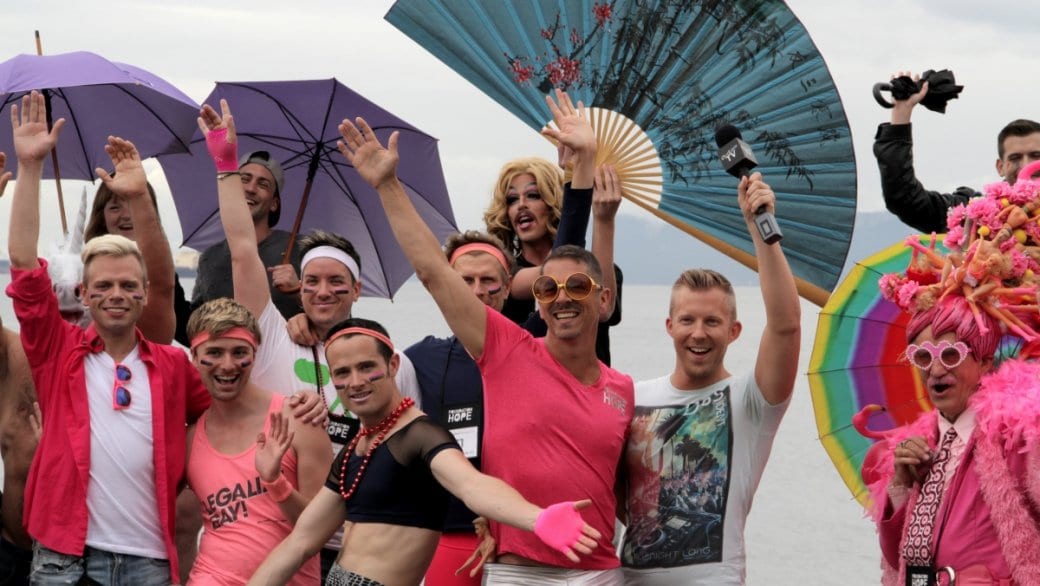A fledgling Vancouver charity that supports LGBT refugees says it’s rethinking its approach to fundraising after it saw a dip in donations this past year.
The charity, Rainbow Foundation of Hope, raises funds mainly through its annual Strut Walk, held in June for the last two years. Participants wear gender non-conforming footwear and march through downtown Vancouver. The charity — established two years ago — in turn awards the funds raised to other charities that have support programs for LGBT refugees.
This year’s Strut Walk raised roughly $45,000, only 80 percent of the $58,000 volunteers committed to raising, says president Carl Meadows.
The $45,000 raised is also down from the previous year’s inaugural Strut Walk, which raised a total of $51,000.
The figures contrast with a slight increase in participation. This year, 120 people took part, compared to around 100 the year prior.
According to Meadows, the gap between projected and actual donations is an issue to tackle in the run-up to next year’s event.
“That was one of the lessons learned,” he says.
“How do you translate signing up for Strut into following through with the commitment of raising money? There are different levels of comfort with that.”
Still, Meadows maintains the event went well overall this year — $40,000 was the baseline target.
“We were still very, very happy with the outcome.”
This year’s Strut Walk took place on June 11, 2016. (Angelina Cantada and Hannah Ackeral/Daily Xtra)
The Rainbow Foundation of Hope received charitable status from the Canada Revenue Agency in March 2015, just months before its first Strut Walk. Since then, the charity claims to have raised just over $100,000. The funds are doled out as grants to registered charities for either community service projects or private refugee sponsorships.
“When newcomers arrive they sometimes are faced with issues, for example, they’re trans individuals who require medication,” explains Chad Wilkinson, chair of the organization’s grant committee. “We would be able to supply them with funds to help them with those services.”
But the application process is strict, and precludes organizations without registered charitable status — a policy determined by the Canada Revenue Agency. This means some organizations, such as Vancouver’s Rainbow Refugee, aren’t eligible to receive funds directly, Wilkinson says.
Instead, Rainbow Refugee co-founder Chris Morrissey says they have to partner with other charitable groups to apply for and hold funds on their behalf. Those groups, such as the United Church of Canada, can then disperse resources for Rainbow Refugee projects.
“The process is very cumbersome and requires other organizations to make the application,” Morrissey says.
Morrissey says Rainbow Refugee, which has been helping LGBT refugees escape persecution in their home countries since 2001, sometimes by connecting them with potential private sponsors in Canada, has applied for charitable status and is now awaiting an answer from the Canada Revenue Agency.
In 2015, the Rainbow Foundation of Hope awarded $25,000 in sponsorship and community service grants to two charities, Mosaic BC and Rainbow Railroad, comprising 64 percent of total expenses. This year, roughly $22,000 in community service grants went to Egale Canada Human Rights Trust and the Inland Refugee Society.
The Rainbow Foundation of Hope spent 12 percent of its expenses on management and administration, and 24 percent on fundraising in 2015. Those figures, which come directly from the Canada Revenue Agency, aren’t yet available for this year.
According to Darae Lee, manager of Mosaic BC’s settlement and integration program, the $7,500 grant awarded by the Rainbow Foundation of Hope last year was critical to its I Belong program, a free counselling program for LGBT refugees. The program started two years ago under federal government funding. Six months after starting, that funding was cut.
The Rainbow Foundation of Hope grant has since allowed the organization to hire three counsellors who specialize in refugee trauma to help LGBT refugees transition to life in Canada.
“They explore their own feelings, make connections with other newcomers and with other resources as well,” Lee says.
“Without the funding we wouldn’t be able to continue this clinical counselling project.”

 Why you can trust Xtra
Why you can trust Xtra


